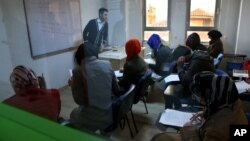President Recep Tayyip Erdoğan says Turkey has spent nearly $6 billion on 2 million Syrians and Iraqis who have fled the conflicts in their countries and he says it is time developed nations do their “duty” and take in more refugees but there are few signs European Union countries are ready to do so.
Last week, Germany’s Foreign Minister Frank-Walter Steinmeier, who has often clashed in the past with Erdoğan on a host of issues, agreed with the complaints of the Turkish president and other Mideast neighbors of Syria and Iraq, who are all laboring to cope with the huge refugee pressure the wars have brought.
Germany is one of the few EU countries to have taken in large numbers of Syrian refugees - 130,000 so far - and during a tour of the region he acknowledged in speeches in Jordan and Lebanon that the EU is falling far short of what needs to be done, calling for burden-sharing when it comes to the refugees.
At least four million Syrians have fled their war-torn country, now in its fifth year of widespread conflict, with Turkey and Lebanon hosting just under two million each and Jordan sheltering more than half-a-million. Some refugees organizations suspect the numbers could be higher.
But even when it comes to the burden-sharing of refugees - African as well as those from the Middle East - washing up on the shores of Europe’s southern states after perilous journeys on board the boats of people smugglers there is little agreement between EU countries about what should be done.
Mandatory quota system
The European bloc’s bureaucracy in Brussels has drawn up radical plans to introduce mandatory national quotas requiring all 28 EU countries to accept a share of the “boat people” and to resettle refugees still outside Europe languishing in Syria’s near-neighbors. That represents a sharp departure of the union’s immigration rules but several countries are opposed to the proposal, including Britain and Finland.
All European governments are under political pressure to reduce immigration and several have seen the rise of anti-immigrant political parties.
Theresa May, Britain’s Home Secretary in the newly elected majority Conservative government, said Britain would refuse to accept a mandatory refugee quota system.
The British are focusing their criticism of the mandatory quota system on the Mediterranean boat crisis, arguing that most of the refugees taking that illegal route to enter Europe are economic migrants mainly from Africa.
May told reporters “Often, the issue is perceived as being people who are refugees from Syria. Those coming across the Med – they are coming from countries such as Senegal, Eritrea, Sudan. Many will have paid organized crime groups to get them through. It is a different sort of issue from Syrian refugees.”
But Britain has taken in only 4,000 Syrian refugees. The British refusal to accept mandatory quotas has been criticized by refugee rights groups. “It is shameful that the British government seems eager to opt out of doing the right thing by some of the world’s most desperate people,” said Anna Musgrave of the UK Refugee Council.
'Orderly relocation'
The U.N., too, has drawn up radical plans for what it calls an “orderly relocation” of thousands of refugees, Syrian and others, when they arrive illegally on the shores of Italy and Spain, allowing some of them to move more easily to the richer countries of the north.
But with little agreement among European countries about what to do with the boat people, there seems a remote chance of any agreement about how to relieve the refugee pressure on Turkey, Lebanon and Jordan and how to provide a safe, legal route for refugees languishing in those countries.
Discriminatory stealth policy
Lebanese officials are not only concerned at the failure of European nations to take in large numbers of refugees, they are also critical of what they see as a discriminatory stealth policy by the few European governments prepared to resettle Syrians.
Lebanese Foreign Minister Gebran Bassil has publicly accused Germany and the Scandinavian countries of selecting mainly higher-skilled refugees and Christians for resettlement. Syrian refugees have long maintained that Christians and graduates have a better chance of being selected for resettlement in Germany and there is a brisk trade in both Lebanon and Turkey for forged graduate documentation.
Over the weekend Bassil brought the claim out into the open stating at a news conference, “We are concerned about the strategy followed by some countries to choose the people they receive in their countries based on certain specifications such as culture and religion…On the one hand, [these positions] encourage the displaced not to return to their homeland, and on the other, contribute to emptying the region of its essence; that is, the diversity of religious groups.”
European officials dismiss the allegation. Without access to the full records of the refugees being resettled it is impossible for the media to assess the Lebanese claim. But Lebanese officials warn that such a discriminatory policy will have the result of filtering the best and brightest for Europe’s benefit -- undermining the principal of providing war refugees with just temporary shelter so that later they can return to their homeland to rebuild. They say it also leaves the less skilled as a burden on Syria’s neighbors.




